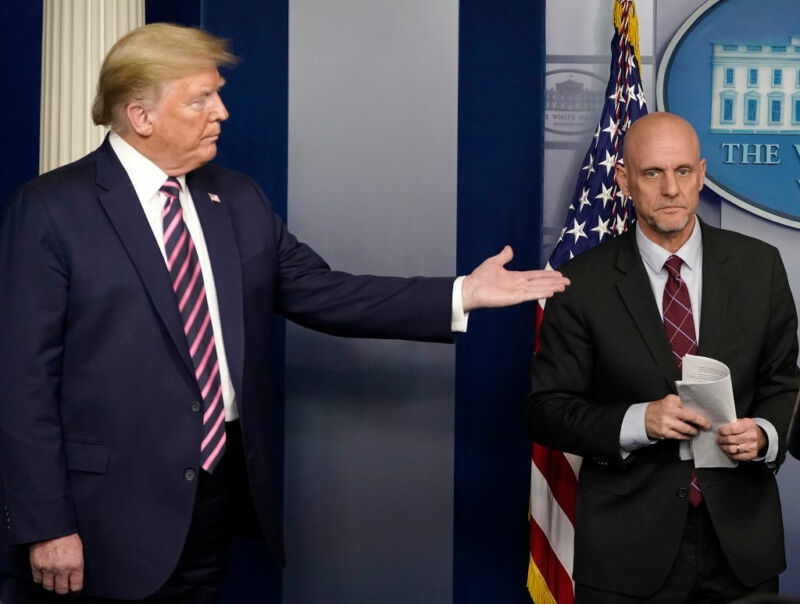Not a plasma rifle —
Trump announces a COVID-19 Emergency Use Authorization for blood plasma
Move reportedly happens over objections of health officials about limited data.

Today, President Trump held a news conference to announce that the FDA has granted an Emergency Use Authorization for the treatment of COVID-19 cases using blood plasma from those formerly infected. The move comes despite significant uncertainty regarding just how effective this treatment is, and comes just days after Trump attacked the FDA for delaying its work as part of a plot to sabotage his re-election.
In the blood
Plasma is the liquid portion of the blood, which (among other things) contains antibodies. It has been used to treat other infections, as some antibodies can be capable of neutralizing the infecting pathogen—binding to the bacteria or virus in a way that prevents it from entering cells. Early studies have indicated that it's relatively common for those who have had a SARS-CoV-2 infection to generate antibodies that can neutralize the virus in lab tests, although the antibody response to the virus is also highly variable .
In the absence of any effective treatments, people started testing this "convalescent plasma" as early as March , and testing has been expanded as the pool of post-infected individuals has continued to grow. But so far, the evidence has been mixed. One of the largest studies, led by researchers at the Mayo Clinic and including over 35,000 patients, did see an effect , but it was a very mild one: mortality dropped from 11.9 percent in people who received plasma four days or more after starting treatment, compared with 8.7 percent if treatment was started earlier than that. But, critically, the study lacked a control group, leaving its authors talking about "signatures of efficacy," rather than actual evidence of efficacy.
Only two small randomized clinical trials were cited in the FDA's memo in support of the decision . One saw no effect , while the second stopped early , with the researchers writing, "observations caused concerns about the potential benefit of convalescent plasma in the study population and after discussion with the data safety monitoring board, the study was discontinued."
Early data like this can still be sufficient to allow an Emergency Use Authorization, which simply requires some evidence of efficacy for a product that is known to be safe and for which there are no alternatives. But, the evidence was so weak that the New York Times reported last week that when the FDA considered granting plasma an Emergency Use Authorization earlier, key health officials including Anthony Fauci and Francis Collins stepped in to block it. The Times, however, reported that the authorization was on hold, something that clearly isn't the case.
Politics, not evidence
What might have driven the decision to push forward was a direct attack on the FDA by President Trump, who said the agency was delaying critical studies of COVID-19 therapies. He went on to suggest that the motivation was to undercut his re-election, saying "Obviously, they are hoping to delay the answer until after November 3rd."
At the press conference in which the decision was announced, Trump called convalescent plasma a "powerful therapy." He seemingly used the difference between 11.9 percent and 8.7 percent, seen in the Mayo study, to say it was "proven to reduce mortality by 35 percent." Trump went on to call that "very effective."
The other speakers, FDA Commissioner Stephen Hahn and head of Health and Human Services Alex Azar, were left to add the caveats. These included the early start to the treatment, and that the 35 percent figure only applied to people under 80 years of age who didn't need a ventilator. Hahn went on to say that the treatment was only really effective if the plasma had high levels of SARS-CoV-2 specific antibodies. When Trump was asked about the discrepancy between his claims and the more nuanced data, he handed it off to Hahn to answer—he provided an answer that basically said that plasma treatment met the legal requirements for an Emergency Use Authorization. That turned out to be the final question Trump took (he only took three).
There are some reasons to think antibodies might be effective at limiting SARS-CoV-2 infections. And there has been a steady stream of neutralizing antibodies described in the scientific literature, suggesting these could be manufactured in large quantities, obviating the uncertain supply of regular plasma donations by those who have cleared an infection. But, as of yet, there's no clear evidence that these antibodies have a clinical effect, nor on the course of treatment that's needed to produce that effect (which is why we've covered none of the discoveries of neutralizing antibodies).
Given this uncertainty and the reports of dissent among public health officials, the decision to push the Emergency Use Authorization now, right after Trump's attack on the FDA, suggests that it was made in response to political pressure, rather than the best available evidence.
Via PaApNews